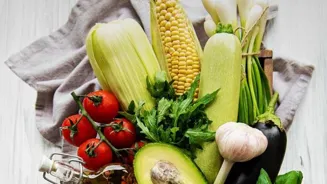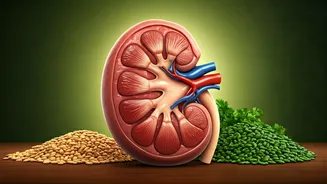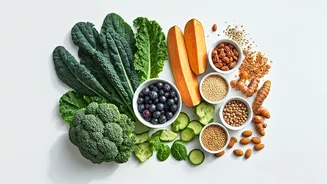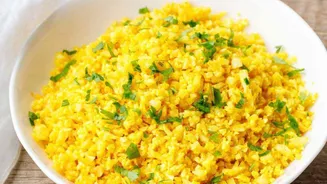Uncover the truth about raw food diets! Dive into 10 must-know facts for a healthier you. Read more!
Namaste, readers! In the hustle and bustle of our daily lives, we are always looking for ways to improve
our health and well-being, isn't it? One such trend that has been gaining popularity is the raw food diet. But is it truly healthy, or is it just another fad?
Let's dive into the world of raw foods and uncover the facts, with a desi twist!
Raw food diet: consuming unprocessed foods for health benefits
The raw food diet, at its core, is all about consuming foods in their natural, unprocessed state. Think fruits, vegetables, nuts, seeds, and sprouted grains and legumes.
The idea is that heating food above a certain temperature (usually around 104-118°F or 40-48°C) destroys its natural enzymes and reduces its nutritional value.
Proponents of the diet believe that eating raw foods improves digestion, boosts immunity, increases energy levels, and helps in weight management. While that sounds good in theory, let's look at some concrete facts, no?
Raw vs. cooked: Nutrient benefits vary, balance is essential
Raw fruits and vegetables are undoubtedly packed with vitamins, minerals, and antioxidants. Consider a juicy, raw mango in the summer, bursting with Vitamin C and beta-carotene! Or a crunchy carrot, full of Vitamin A and fiber. Eating these raw ensures you're getting the most out of these nutrients.
However, it's important to note that some nutrients are actually more bioavailable when food is cooked. Think about cooked tomatoes – the lycopene (a powerful antioxidant) is more easily absorbed by the body when the tomatoes are heated. In that case, balance is key, bhai!
Raw foods high in fiber aid digestion, but increase slowly to avoid discomfort
Raw foods are rich in fiber, which is fantastic for digestion. Fiber helps keep things moving smoothly, prevents constipation, and promotes a healthy gut. But for some people, a sudden increase in fiber intake can lead to bloating, gas, and discomfort.
Especially if you're not used to eating a lot of raw vegetables, your body might need some time to adjust. Start slow, friends, and listen to your body.
Raw food diet overstates benefits of food enzymes; body produces own
The raw food diet emphasizes the importance of enzymes in food, claiming that they aid in digestion. While it's true that raw foods contain enzymes, most of these enzymes are broken down in the stomach acid before they even reach the intestines.
Your body naturally produces its own digestive enzymes, so relying solely on food enzymes might not be as beneficial as you think.
Eating raw foods increases risk of foodborne illnesses. Wash produce well
Eating raw foods means you're also at a higher risk of foodborne illnesses. Raw produce can be contaminated with bacteria like E. coli, Salmonella, or Listeria. Always wash your fruits and vegetables thoroughly before eating them.
And remember, some foods (like sprouts) are riskier to eat raw and should ideally be cooked properly. Safety always comes first, beta!
Raw food diet aids weight loss initially, but long-term challenges exist
A raw food diet can definitely aid in weight loss, at least initially. Raw foods are generally lower in calories and higher in fiber, which helps you feel full and satisfied. But maintaining a raw food diet long-term can be challenging.
You need to ensure you're getting all the necessary nutrients, and the limited food choices can lead to cravings and eventually overeating. Patience and planning is required!
Raw food diet not suitable for all, consult expert before change
While some people may thrive on a raw food diet, it's not suitable for everyone. Children, pregnant women, and individuals with weakened immune systems should be particularly cautious.
These groups need a balanced diet with a variety of cooked and raw foods to ensure they're getting all the nutrients they need. Always consult with a doctor or a registered dietician before making significant changes to your diet.
Maintain variety in raw food diet for nutrient balance
One of the biggest challenges of a raw food diet is maintaining variety. It's easy to get stuck in a rut eating the same foods over and over again, which can lead to nutrient deficiencies. Get creative with your recipes! Explore different types of fruits, vegetables, nuts, and seeds.
Try making raw dips, salads, and even desserts. Remember, eating healthy should also be enjoyable!
Raw vegan diet lacks B12; consider supplements for health
Vitamin B12 is primarily found in animal products. A strict raw food diet, especially a vegan one, can be deficient in B12. This vitamin is crucial for nerve function and red blood cell production. If you're following a raw vegan diet, consider taking a B12 supplement to avoid deficiency.
It's always good to be aware of these little things, no?
Challenges of following raw food diet in India
Let's be honest, following a raw food diet can be challenging in social situations, especially in India, where most meals are cooked. Eating out at restaurants becomes difficult, and you might have to explain your dietary choices to friends and family.
Be prepared to bring your own food to gatherings or choose restaurants that offer raw food options. It might need a little creativity, but its manageable.
Moderation and balance key for a healthy diet, include raw foods for benefits
Ultimately, the key to a healthy diet is moderation and balance. You don't have to go completely raw to reap the benefits of raw foods. Incorporating more raw fruits and vegetables into your existing diet can be a great way to boost your nutrient intake and improve your overall health.
Listen to your body, experiment with different foods, and find what works best for you.
Ten facts to consider for raw food diet; prioritize well-being
So, there you have it! Ten facts to consider when thinking about the raw food diet. Remember, there's no one-size-fits-all approach to health. What works for one person might not work for another. Be informed, be mindful, and most importantly, prioritize your well-being, always!













